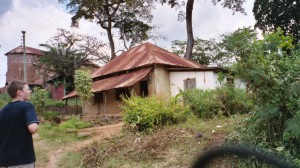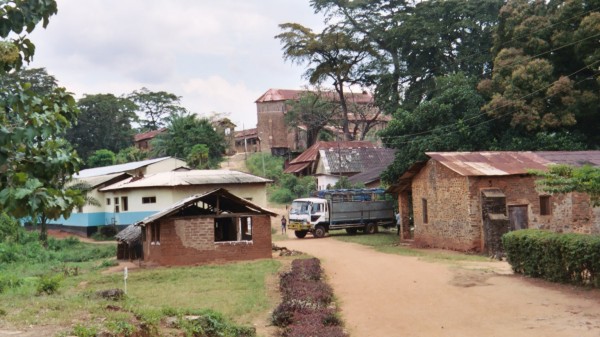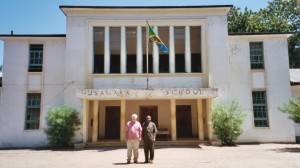A Journey to
As I
write this, Gordon Brown, the Chancellor of the Exchequer
is planning his first ever trip to
Our own
family visit in 2004 produced an amazing mixture of
emotions. Rosemary and I had met thirty years
previously at a very rural hospital about twenty five
miles inland from the port town of
What had once been a thriving hospital was now two secondary schools (a new hospital has been built in the main town three miles away) but the village remained much as it had been then. And that was both a delight (so much that was familiar, the doctor’s house with the room they built for Rosemary, the lovely bell tower in the church....) - and a real shock (could it really be true that after thirty years of hard work, huge sacrifices and hardship for local people, decades of development assistance, things had simply stayed as they had been - no progress at all?).

The doctor's house, with Rosemary's room - the white extension made of mud and sticks
We saw
listless, malnourished children; flimsy houses with poor
sanitation. The vicar of the village church was at
pains to tell us of the work of his church and the large
congregation - and, just to make us feel really at home,
to show us the small hole in the roof through which the
heavy rains entered and threatened to cause great damage
to a church which was over one hundred years old.

Magila village with the church on the hill
But the
cost of new material for the roof - corrugated iron in
this case - was way beyond the means of his congregation.
Prices have risen astronomically; when I worked there one
pound bought twenty Tanzanian shillings - the exchange
rate is now 12,000 shillings to the pound. Father
Sam Ndimbo of St Anne’s in Liuli - much further
South in Tanzania - has been a regular visitor to our
parish in Maidstone and on each visit he brings further
tales of impossible prices. But we saw it with our
own eyes. Anything imported is impossibly expensive
and the policies of the international financial
institutions (IMF, World Bank) have effectively destroyed
most of the indigenous industry. And anyway the
average daily wage for a Tanzanian is still less than US$1
per day (it is an interesting thought that every cow in
Through
it all Tanzanians remain wonderfully positive, resolute
and hospitable with very little bitterness about their
own situation. Churches and mosques are very well
attended and the different religious communities work
very closely together. We found it humbling that
people who had nothing still wanted to share with us, and
we found our own position - rich and privileged - very
uncomfortable.
I was
delighted to visit again the school where I had taught
back in the ‘70s (I had been a science teacher) and
to see a vibrant, hard-working community of 1500 students
and more than 50 staff. Annual school fees are $US40
which is a massive investment for poor families; it was
perhaps no surprise that the students were alert, keen
and very hard-working. (It was, however, intriguing
that the only real splash of colour in the whole school
was to be found on the walls of the art-room - a huge
poster from Kent Institute of Art and Design,

John Fowler with Mwalimu Mkwizu, headteacher of Usagara Secondary School, Tanga
The town
of
It was
such a great pleasure and privilege to be back in that
wonderful country and to find that I was still able to
communicate effectively although my Swahili had got very
rusty (I find few opportunities to use it in
I hope
Gordon Brown has some good people to show him what life
there really means and to advise him on his efforts to
persuade the G8 to make a difference. Aid is
terribly important and it is reassuring to know that he
is so committed to increasing the amount to Africa; but
so much more important is a commitment to fair trade and
to enabling folk to stand up for themselves. I will
be reading the papers avidly and following his travels
with great interest. ‘Safari njema, Bwana
Brown!’ (Have a good trip, Gordon.)
As has
been pointed out recently by some commentators,
John
Fowler